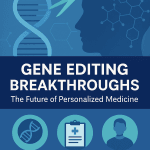This article is for informational purposes only and should not be considered medical advice. Always consult a healthcare professional for personalized recommendations.
Introduction
Cancer remains one of the leading causes of death worldwide, but recent research has illuminated various strategies to reduce the risk of developing this disease. Understanding these strategies can empower individuals to make informed choices about their health. In this article, we delve into the latest findings on cancer prevention, focusing on lifestyle changes, nutrition, and emerging research.
The Role of Lifestyle in Cancer Prevention
Numerous studies have shown that lifestyle choices significantly impact cancer risk. According to the American Cancer Society, approximately 30-50% of all cancers can be prevented through lifestyle modifications. This statistic underscores the importance of understanding how our daily choices can influence our long-term health.
Nutrition: Eating for Health
Your diet plays a crucial role in cancer prevention. Recent research indicates that a diet rich in fruits, vegetables, whole grains, and lean proteins can lower cancer risk. For example, a study published in PubMed found that individuals who consumed a Mediterranean diet had a 25% lower risk of developing certain types of cancer. This diet emphasizes whole foods and healthy fats, providing a robust framework for cancer prevention.
Key Nutrients
- Antioxidants: Foods high in antioxidants, such as berries and leafy greens, help combat oxidative stress, which can lead to cancer. Oxidative stress occurs when there is an imbalance between free radicals and antioxidants in the body, potentially damaging cells and leading to cancer development.
- Fiber: High-fiber diets have been linked to a reduced risk of colorectal cancer, according to a report by the CDC. Fiber helps regulate digestion and may influence the gut microbiome, which is increasingly recognized as playing a role in cancer risk.
- Healthy Fats: Incorporating healthy fats, like those found in avocados and nuts, can also be beneficial. Omega-3 fatty acids, in particular, have anti-inflammatory properties that may help reduce cancer risk.
Physical Activity: Move to Prevent
Regular physical activity is another cornerstone of cancer prevention. The World Health Organization (WHO) recommends at least 150 minutes of moderate-intensity aerobic activity each week. Research shows that being physically active can lower the risk of several cancers, including breast and colon cancer. Exercise not only helps maintain a healthy weight but also enhances overall well-being.
How Exercise Helps
- It helps maintain a healthy weight, reducing the risk of obesity-related cancers. Obesity is a known risk factor for several types of cancer, including breast, colon, and endometrial cancers.
- Physical activity boosts the immune system, enhancing the body’s ability to fight cancer. Regular exercise can improve immune surveillance, making it more effective at detecting and eliminating cancer cells.
- Exercise can improve hormone levels, which may influence cancer risk. For example, regular physical activity can lower estrogen levels, potentially reducing the risk of hormone-related cancers.
Other Significant Factors in Cancer Prevention
Avoiding Tobacco and Limiting Alcohol
Tobacco use is the leading cause of preventable cancer worldwide. The CDC reports that smoking is linked to at least 15 different types of cancer. Quitting smoking can dramatically reduce your risk, even if you’ve smoked for years. It’s important to recognize that secondhand smoke also poses significant risks to non-smokers.
Similarly, alcohol consumption has been linked to an increased risk of various cancers, including breast and liver cancer. The NHS advises limiting alcohol intake to reduce these risks. The current guidelines suggest that both men and women should not regularly drink more than 14 units of alcohol per week.
Cancer Screening and Vaccination
Regular cancer screenings can detect cancer early when it is most treatable. For instance, mammograms for breast cancer and colonoscopies for colorectal cancer are vital tools. The American Cancer Society emphasizes the importance of adhering to screening guidelines based on age and risk factors. Early detection can significantly improve survival rates.
Vaccinations also play a role in cancer prevention. The HPV vaccine can prevent cervical and other types of cancer, while the hepatitis B vaccine can reduce the risk of liver cancer. Vaccination is a proactive measure that can save lives.
Emerging Research and Future Directions
As research evolves, new strategies for cancer prevention continue to emerge. For instance, studies are exploring the role of the microbiome in cancer risk. Preliminary findings suggest that a healthy gut microbiome may influence inflammation and immunity, potentially reducing cancer risk. A balanced microbiome could enhance the body’s ability to ward off cancerous changes.
Additionally, researchers are investigating the impact of mental health on cancer prevention. Stress management techniques, such as mindfulness and yoga, may not only improve quality of life but also enhance immune function. Chronic stress has been linked to inflammation and may contribute to cancer progression.
Myth vs. Fact
Myth: Cancer is solely caused by genetics.
Fact: While genetics play a role, lifestyle factors account for a significant portion of cancer risk. Environmental influences and personal choices can modify genetic predispositions.
Myth: Only older adults need to worry about cancer prevention.
Fact: Cancer can affect individuals of all ages; adopting healthy habits early can significantly reduce risk. Young adults should also be aware of their cancer risk and engage in preventive measures.
Myth: There’s nothing I can do to prevent cancer.
Fact: Many lifestyle changes can lower your risk, including diet, exercise, and avoiding tobacco. Empowering yourself with knowledge about cancer prevention can lead to proactive choices.
Patient Vignette
Consider Sarah, a 45-year-old woman who decided to make lifestyle changes after her mother was diagnosed with breast cancer. Initially overwhelmed, she began researching cancer prevention strategies and sought guidance from her healthcare provider. Sarah started following a Mediterranean diet, incorporating more fruits and vegetables into her meals, and began a walking routine. Over the next year, she not only lost weight but also felt more energetic and healthier overall. Regular screenings have become part of her routine, giving her peace of mind and empowering her to take charge of her health.
Frequently Asked Questions
What are the best foods for cancer prevention?
Foods rich in antioxidants, fiber, and healthy fats are beneficial. Incorporate plenty of fruits, vegetables, whole grains, and lean proteins into your diet. Consider foods like berries, spinach, nuts, and fatty fish.
How much exercise do I need for cancer prevention?
The WHO recommends at least 150 minutes of moderate-intensity aerobic activity each week to help lower cancer risk. This could include brisk walking, cycling, or swimming.
Can stress increase cancer risk?
While stress itself does not directly cause cancer, chronic stress can weaken the immune system, potentially impacting cancer risk. Managing stress through mindfulness or physical activity may be beneficial.
Is it too late to change my lifestyle to prevent cancer?
It’s never too late to make positive changes. Even small adjustments can significantly reduce your risk. Every step towards a healthier lifestyle counts.
What role do screenings play in cancer prevention?
Screenings can detect cancer early, improving treatment outcomes. Follow recommended guidelines for your age and risk factors to ensure timely detection.
Are there vaccines that can help prevent cancer?
Yes, vaccines like the HPV vaccine can prevent certain cancers, including cervical cancer. Staying updated on vaccinations is a key aspect of cancer prevention.
Conclusion
While the threat of cancer can be daunting, understanding and implementing effective prevention strategies can significantly reduce your risk. By focusing on nutrition, physical activity, and regular screenings, you can take proactive steps toward a healthier future. Stay informed, stay healthy, and remember that every small change counts. Your health is in your hands, and every choice you make can contribute to a cancer-free future.
Key Takeaways
- Adopting a Mediterranean diet can lower cancer risk by 25%.
- Regular physical activity reduces the risk of several cancers.
- Avoiding tobacco and limiting alcohol are crucial for prevention.
- Regular screenings can detect cancer early, improving outcomes.
- Vaccinations like HPV can prevent certain cancers.
- Managing stress may also play a role in reducing cancer risk.
References
- American Cancer Society. (2023). Nutrition and Physical Activity Guidelines.
- Centers for Disease Control and Prevention. (2022). Colorectal Cancer Screening.
- World Health Organization. (2023). Physical Activity.
- NHS. (2023). Alcohol and Cancer Risk.
- PubMed. (2023). Mediterranean Diet and Cancer Risk.
- UpToDate. (2023). Cancer Prevention Strategies.








Post a comment